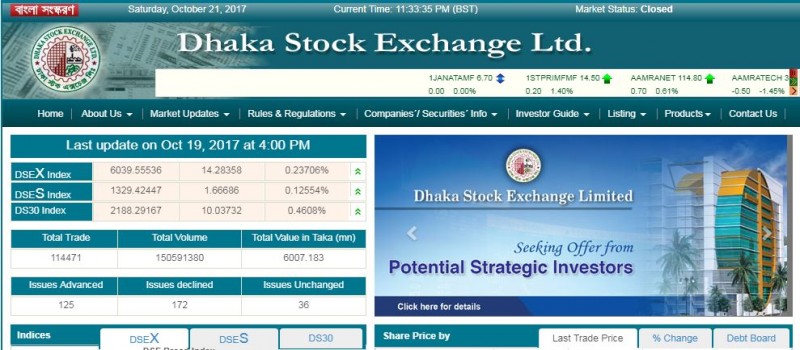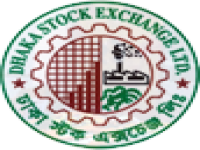

The necessity of establishing a stock exchange in the then East Pakistan was first recognised by the government when, early in 1952, it was learnt that the Calcutta Stock Exchange had prohibited transactions of Pakistani shares and securities. The Provincial Industrial Advisory Council of Pakistan soon set up an organizing committee for the formation of a stock exchange in East Pakistan. A decisive step was taken in the second meeting of the organizing committee held on 13thMarch, 1953. In the cabinet room, Eden Building, under the chairmanship of A. Khaleeli, Secretary of the Government of East Bengal, Commerce, Labor and Industries Department, various aspects of the issue were discussed in detail. The central government’s proposal regarding the opening a branch of Karachi Stock Exchange at Dhaka did not find favor with the meeting who felt that East Pakistan should have an independent stock exchange. It was suggested that Dacca Narayanganj Chamber of Commerce & Industry should approach its members for purchasing the membership cards at RS. 2000 each for the proposed Stock Exchange. It was thought that the location of the exchange should be either at Dhaka or Narayanganj or Chittagong. An organizing committee was appointed consisting of leading commercial and industrial personalities of the province with Mirza Mehdi Ispahani as the convener in order to organize the exchange.
Currently two types of Equity instruments are tradable at DSE -
Equity
These are ordinary shares of listed companies. For a certain period from the IPO date certain number of shares are not tradable. 3 years after listing all shares are usually tradable unless there are right offerings. Directors’ portion of right shares are not tradable for 1 year. DSE Indices are calculated based on free float shares of selected listed companies. Free float is adjusted for non tradable shares, institutional holdings, strategic holdings and sponsor-director holdings. Equity shares depending on the category have settlement period of T+2 or T+9. For implementation of record dates for corporate actions shares are sometimes placed on T+0 settlement cycles for certain number of days.
Mutual Funds
These are units of one of the variants of listed collective investment schemes. These funds are usually closed end mutual funds governed by the Securities and Exchange Commission (Mutual Funds) Rules, 2000 and is backed by one corporate sponsor and usually is named with the sponsors name. The sponsors are required to hold at least 10% of the holding for at least a period of 1 year and 1% of the holding for the total life of the fund. There are designated Asset managers and Trustees. The Asset Managers manage the funds on day to day basis and investment strategies are governed by the IPO prospectus and is supervised by the Trustees. All assets of a mutual fund is maintained with a custodian. Mutual funds are traded on a T+2 settlement cycles. For implementation of record dates for corporate actions shares are sometimes placed on T+0 settlement cycles for certain number of days. Mutual Funds are not parts of any indices. Asset managers are required to disclose NAV of respective mutual funds on weekly basis.
Debt
Currently three types of Debt instruments are tradable at DSE –
Corporate Bonds
There are corporate bonds issued by companies that may or may not be listed with DSE. All current bond issuers are listed with DSE. Corporate Bonds are traded on T+2 settlement period trading fees, unlike equities, are fixed at Taka 50 per transaction.
Treasury Bonds
All treasury bonds issued by the Bangladesh Bank (Central Bank of Bangladesh) are listed with DSE. The common maturities are 5, 10, 15 and 20 years. Coupon rate varies from 8.5% to 13% depending on when the bonds were issued. Par value of each treasury bond is Tk. 100,000. There is a alternate market for trading treasury bonds hosted by Bangladesh Bank where the AD Banks can participate in trading. Settlement period for treasury bonds are T+0 and trading fees, unlike equities, are fixed at Taka 50 per transaction.
Debentures
These are unsecured debt instruments issued by listed companies. They carry both variable and fixed interest rates. All currently listed debentures are matured and are still listed due to some incomplete legal proceedings. Debentures are traded on T+2 settlement period trading fees, unlike equities, are fixed at Taka 50 per transaction.
Future Products
DSE has already initiated steps to explore and ultimately launch various new tradable products starting with Exchange Traded Funds to be followed in the long term by expansion of current product offering to include Convertibles, Bonds, Shariah Compliant Products including Sukuk, ETFs and REITs. Once these products are in mature form the department will be seeking to launch related hedging products. Fresh dialogue with Bangladesh Bank will be initiated to allow active trading of Treasury Bonds on the Exchange. Future Product design, marketing, formation of regulatory framework, stakeholder readiness are all part of work plans for the Division.
